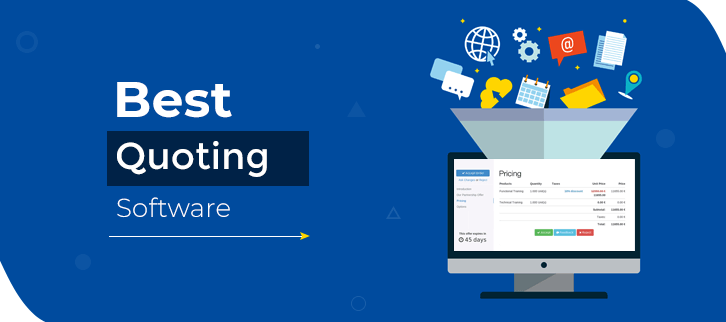As the requirement for real-time data presentation to consumers from any location increases, switching from MS-Excel or MS-Word to quotation management software is necessary. A sales quotation software generates accurate and professional business quotes, reduces the length of one’s sales cycle, and enhances one’s bottom line – we all know these are tremendous benefits. However, with a profusion of sales quoting software available on the market, how can they be sure that the software they choose is the most fantastic fit for their business’s needs?
A sales quotation software that is not operating well might put their salesperson in a pickle and disappoint their clients, eroding their organization’s brand name. Thus, do not be tempted to purchase a sales quotation software merely because it appears on the first page of a search engine, is utilized by a rival, or is more prevalent in the market. Before they choose the quote software, below are some assessment recommendations to keep in mind.
Valuable tips to consider when selecting an effective quotation management software.
-
Make the switch to cloud-based applications.
A desktop program may be a viable solution if their business’s borders are constrain, they want their backups, or on a budget. However, if they wish to scalability, flexibility, and remote access, a quotation management software may provide the necessary outcomes. In addition, due to the fact that it is host on a cloud-based server and maintained by a vendor . There are no installation, update, or maintenance problems.
-
An online payment option is unquestionably advantageous.
One may want to avoid wasting necessary time attempting to convince the consumer to sign the transaction after he has given a favourable nod. Cloud-based quoting software that enables them to take online payments immediately through an electronic signature will significantly increase the value of their sales quotation.
-
Simple or complicated – Sales quotations should include all applicable price criteria.
Percentage and volume-based pricing, discounts, customs and bundles, freight or markups – a business quotation tool should be capable of capturing and generating customized quotes for clients in all potential price scenarios.
-
Do not be afraid to request a free product demonstration.
The easiest method to determine if these features will live up to their claims is to request a free demo or trial from one’s provider. This will not only provide them with a hands-on demonstration of the program’s functionality but will also indicate if they need to install any other software or apps to support the quotation tool. If a seller has little interest in providing them with a free sample or trial, this may suggest that the sales quoting software do not live up to their expectations.
-
Never overlook the importance of reviewing vendor support and services.
Regardless of how low maintenance the quotation software is, they may sometimes need vendor help. Once they’ve evaluated all of the sales quotation software’s capabilities, verify that the seller offers comprehensive technical support for setup, upgrades, and security. If possible, examine the most recent reviews for both the product and the vendor’s services to ensure they’re getting reliable feedback.
Remember that they are spending both money and time on the sales quotation software. Thus, it is prudent to list all the features them want and the expectations they have of the program, and then match them to their requirements.























![To Increase YouTube Subscribers Must Use These Service Provider [New]](https://businessleed.com/wp-content/uploads/2022/11/To-Increase-YouTube-Subscribers-Must-Use-These-Service-Provider-New-360x180.jpg)














